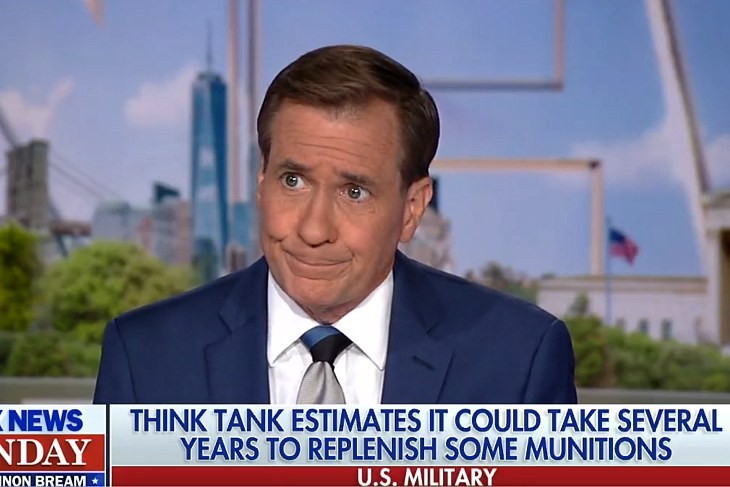Now That the Whole World Knows We're Low on Ammunition, Frantic Effort to Re-Arm Commences
The entire world knows that the United States is low on firepower because President Joe Biden acted on his inexplicable desire to blurt out such information on CNN, telling Fareed Zakaria, “This is a war relating to munitions. And [Ukraine]… is running out of that ammunition, and we’re low on it.”
He also maintained that the shortage was one reason behind the controversial decision to send cluster munitions to Ukraine.
Now the U.S. is scrambling to strengthen stockpiles, according to John Kirby, coordinator for strategic communications at the National Security Council. (By the way, what does that title even mean?)
Appearing with Shannon Bream on “Fox News Sunday,” Kirby described the effort:
We’re working very closely with the defense industry to try to ramp up production, particularly for artillery shells…
You saw that we gave some cluster munitions to Ukraine as a bridging solution here while we ramp up production. We’re having very, very strong conversations with the defense industry and we believe that we’ll be able to get there.
Watch:
Bream had brought up a think tank report that estimated it could take years to get back to where we were:
Kirby was responding to a segment reporting that a Center for Strategic and International Studies report found replacing inventories for ammunitions such as 155 mm shells could take between four and seven years. Replacing Javelins could take up to eight years and Stingers up to as many as 18 years, according to the report.
Meanwhile, he has to convince the manufacturers that the administration is in it for the long haul, saying:
The defense industry obviously wants to make sure that if they’re going to increase production, that production rate is going to stay elevated for a period of time. Because that means hiring more workers, it means retooling and adding capacity in their factories and manufacturing capabilities.
So we understand that and that’s sort of the central thesis here of the discussions that we’re having with them, is to get them to increase production and let them know that we’re serious about doing that for some period of time.
Cocaine in the WH
Kirby also became the latest in a long list of Biden officials offering weak answers about the Secret Service investigation into the cocaine found at the White House, saying investigators “did the best they could” even though they solved nothing. It sounds like he’s talking about little kids who lost a softball game, not about security in what is supposed to be one of the most secure buildings in the world.
Well, again, I can’t really speak to the investigation that was done by the Secret Service. They did the best they could to to track down how it got there, and who it might have belonged to. And they just were not able to come up with any forensic evidence that – that proves it.
But, of course, look, we take this seriously. It’s not the kind of thing we want to see happen. Now, it did happen in a visitor’s lobby area out just outside the main West Wing. So it was a highly trafficked area. We’re going to take a look at how that happened.
And obviously, if there’s things we can do to prevent that in the future, we certainly will do that. Nobody’s happy about this.
It’s embarrassing that our National Security Council spokesman even has to answer questions like these, but that’s what the Biden White House has brought on us. Whose cocaine is in the People’s House? I mean, come on. And talking about our military vulnerabilities on national television because the president couldn’t keep his lips sealed?
It’s humiliating.





Post a Comment